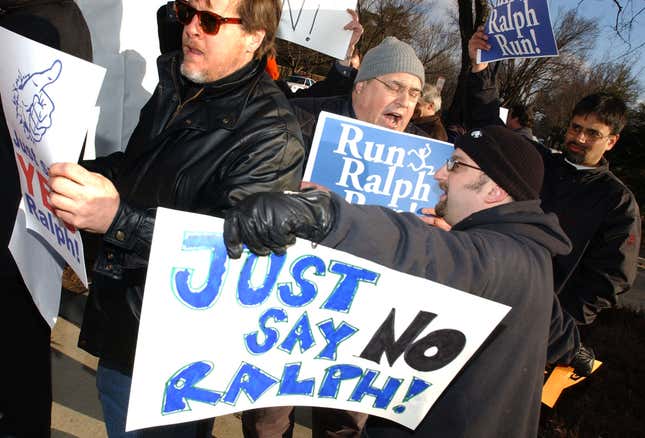I have a confession to make: I voted for Ralph Nader.
It feels good to get that off my chest. For years, my voting record has been a shameful secret. But in my (admittedly weak) defense, I had my reasons for voting Green in 2000. For one thing, as a resident of New York City, I felt confident that my vote would not affect the overall outcome. (Indeed, Al Gore carried the state handily.) My vote was purposely symbolic. It was a protest vote that said, “We can do better,” “We don’t need to settle,” “We should vote with our hearts!” And I felt empowered and unapologetically righteous casting it.
At the same time, I was honestly uninspired by both of the “mainstream” candidates. I was annoyed by Gore’s lackluster, centrist campaign and the way he distanced himself from then-president Bill Clinton.
Fast-forward to September 2001, when I woke up to the sound of a friend on my answering machine, telling me to turn on the TV. I tuned in just in time to see Tower 2 of the World Trade Center collapse in a pile of ash and flame.
What followed were some of the strangest weeks I’ve ever experienced in New York City. The National Guard closed down the city below 14th Street, and my neighborhood could only be traversed via bicycle. They were taking donations at Javits Center, and you could still smell the char from the rubble of downtown. There was an uncommon tranquility in the city as well as an overwhelming sadness. It was during those first few days after the attacks that I began to feel truly American for the first time. There was a very clear, yet unspoken connection between my neighbors and myself.
We were living in a war zone, and we were all Americans, all on the same side. But what happened next would truly shape our country for the next decade. Bush used all of that political capital and patriotism to force his agenda in Iraq. Just like that, the beautiful unity I had felt with my fellow Americans began to erode. Whatever his true motivations (Halliburton, war-profiteering, daddy issues), it’s now clear that the White House’s decision was the wrong one. As a result, many hundreds of thousands would die, and many more would suffer—some at the hands of Americans, some at the hands of their own countrymen.
While it’s impossible to ever know for sure, I’m confident things would have turned out very differently had Gore won the election. Even if we assume 9/11 was unavoidable, the subsequent actions of America’s commander-in-chief were not.
Fast-forward again to 2016, as contentious a presidential election as we’ve seen in several cycles. I know there are many people who, like me in 2000, are voting solely with their hearts this primary season. I’m talking specifically here about Bernie Sanders supporters who have spoken openly about boycotting the national election if their candidate doesn’t win the primary. I admire your principles, but you are making the wrong decision. I know because I was like you once. The protest vote is a powerful tool, but in this case the consequences are not worth the symbolism. The enemy of your enemy is not your friend.
For months, I have watched the ridicule leveled at Hillary Clinton and her supporters, from both liberals and conservatives alike. I’ve seen how vicious and polarizing the race has become, and I worry that all this negativity will lead to only one outcome: a president Trump or Cruz.
If this happens, all the excuses in the world will be unable to separate voter actions from the consequences. I don’t even want to imagine what a United States controlled by extremists in all three branches of government could look like.
I am not being hyperbolic when I say this. Bernie supporters who pledge to vote for Trump out of protest, sit out the election as protest, or write-in Bernie as protest will all share the blame. This is true even of those who live in “safe” states like New York or California. Endorsing these opinions in solid blue states only emboldens and legitimizes those voters in vulnerable contests. Additionally, it gives the hardcore progressive a false sense of righteousness, making engagement and productive discourse increasingly difficult as the contest nears its conclusion. I’m sure as I write this some opportunistic free market capitalist is already having a factory in China print up “Don’t blame me, I voted for Bernie” bumper stickers.

If Trump is elected president, we could very well see the dismantling of our country. This is how empires fall. Maybe as an angry progressive, you feel like our system is so broken we should just burn it all down. But I’m not ready to go there. I’m especially not ready to go there when the progressive movement has not yet offered realistic solutions for the system in question.
Hillary is not a perfect candidate. I do not agree with her on every issue, just as I sometimes disagreed with Barack Obama in 2008. Of course I’d love to live in a country that offered free public education through college and free universal health care and dismantled the oligarchy and overturned the Citizens United Supreme Court ruling and undercut lobbyist influence in Washington. Hopefully, one day we will get there. But this is 2016. Simply wishing something will come true cannot will it into existence.
I support Bernie’s candidacy and his principles. He has helped shape the liberal platform in important ways. We need many more men and women like him in Congress. We need more men and women like him in the legislatures and in the courts.
It’s good that Bernie’s supporters value a candidate with a conscience and a moral compass. But don’t confuse revolution with rhetoric, or integrity with intractability. Don’t make the road of progress rockier than it already is. And when the time comes to cast your ballot this November, don’t make the same mistake I did.
